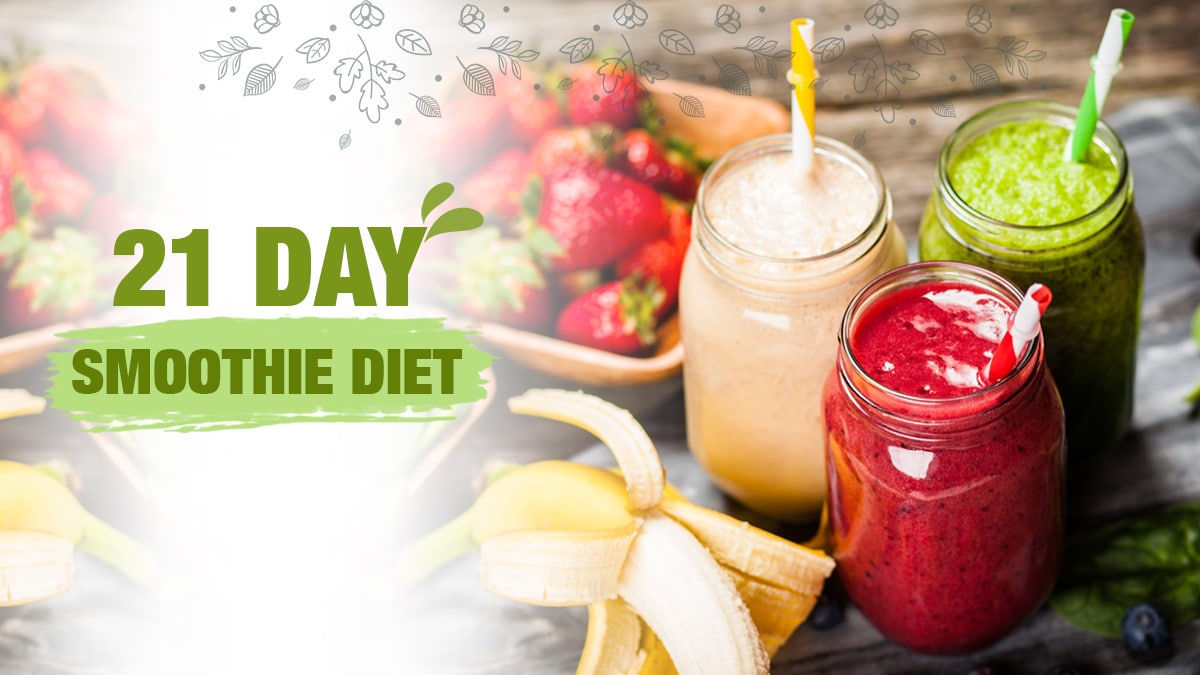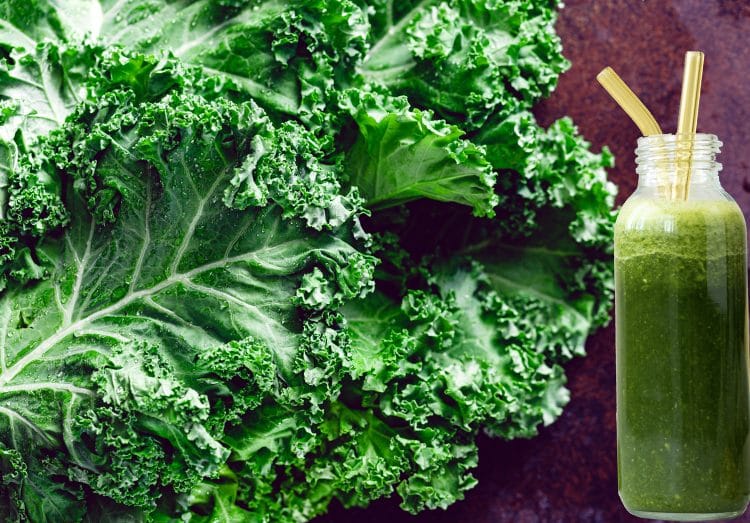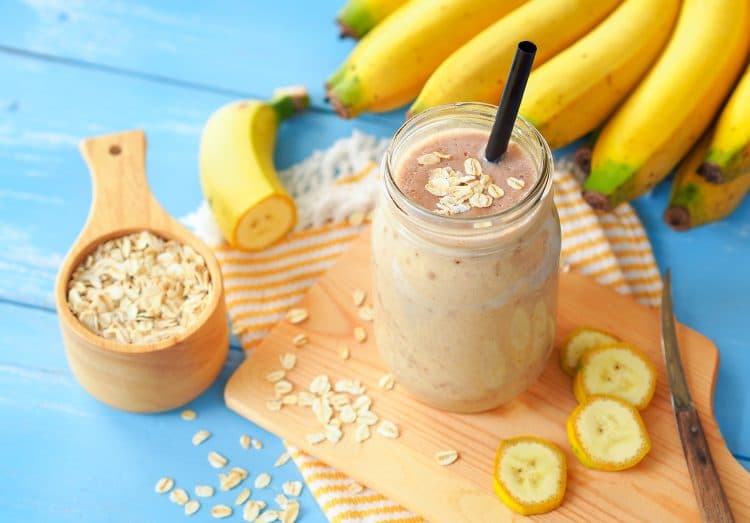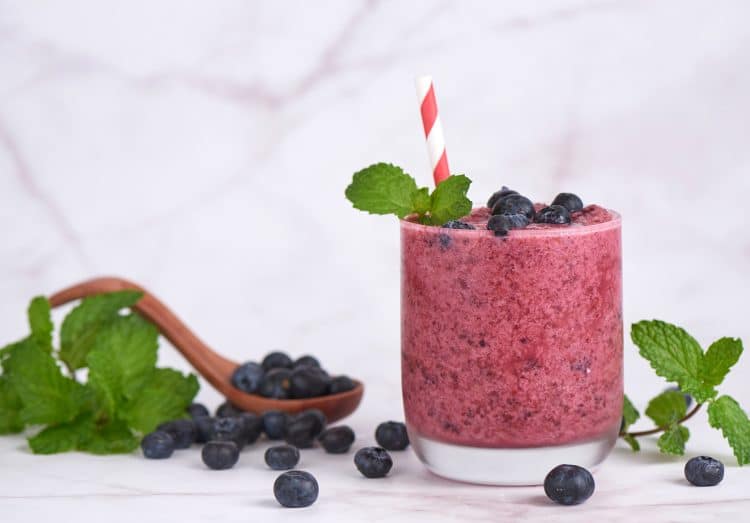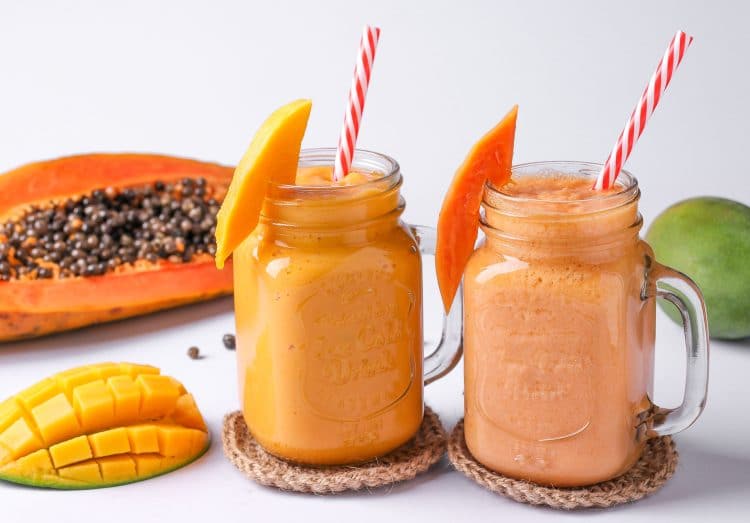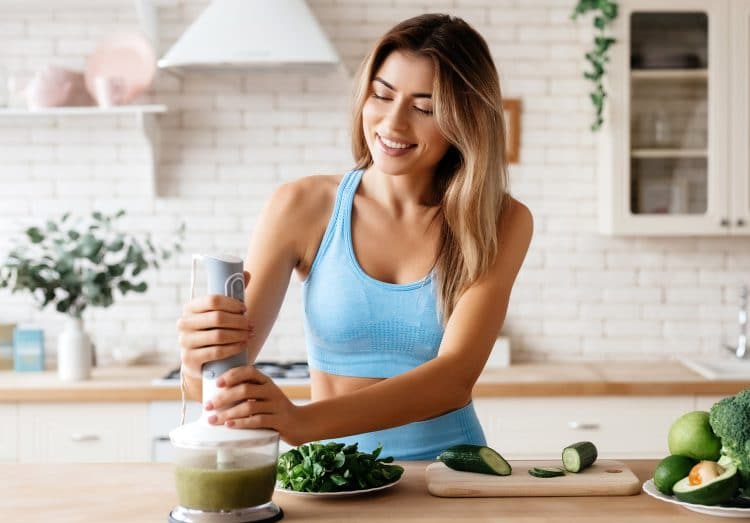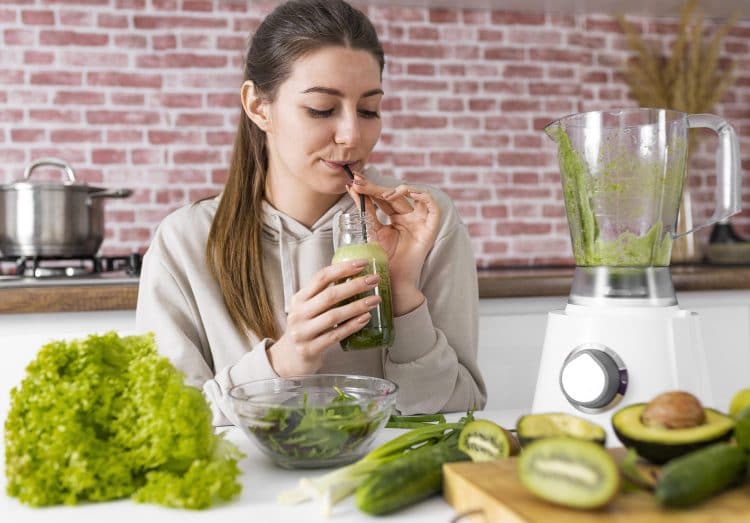About the 21 Day Smoothie Diet
The 21 Day Smoothie Diet is a weight loss plan created by Drew Sgoutas, a health coach and self-proclaimed nutrition expert. He designed this diet to assist his clients in losing weight healthily and maintaining that loss long-term. Drew claims that replacing meals with smoothies can train your body to crave healthier foods instead of sugar. The diet emphasizes consuming more fruits and vegetables while avoiding processed foods. Drew asserts that this diet is healthy and not a fad, although the Centers for Disease Control and Prevention (CDC) states that any diet promising rapid weight loss results is considered a fad diet [1].
The 21 Day Smoothie Diet plan is provided as an e-book, which includes smoothie recipes, meal and snack tips, and shopping lists. The general guidelines of the diet are to replace two meals each day with a smoothie while also being allowed to eat one regular meal and two snacks daily.
What You Eat on the 21 Day Smoothie Diet
To follow the 21 Day Smoothie Diet, you replace two meals, usually breakfast and lunch, with smoothies each day. You can also eat one regular low-calorie meal and two low-calorie snacks each day. The smoothie recipes vary, but each includes fruits and vegetables, with some recipes incorporating small amounts of protein and healthy fat.
There is an option to start the 21-day diet with a 3-day detox. For the 3-day detox, you replace three meals a day with smoothies and only eat two low-calorie snacks, skipping the regular meal.
Healthy Smoothie Recipe Examples
Here are some examples of healthy smoothie recipes that may be similar to those in the 21 Day Smoothie Diet plan [9].
Kale Smoothie
Ingredients
- 2 cups kale leaves
- 1 banana (chopped and frozen)
- 1 cup blueberries
- ½ cup low-fat milk (or milk substitute)
Directions
- Add all ingredients to your blender and blend until smooth.
Chocolate Peanut Butter Banana Smoothie
Ingredients
- 4 oz soy, almond, or non-fat milk
- 2 tbsp natural peanut butter
- 1 banana (chopped and frozen)
- 1 tbsp cocoa powder (unsweetened)
- 1 packet of Splenda
- 2/3 cup ice
Directions
- Add all ingredients to your blender and blend until smooth enough to drink.
Blueberry Antioxidant Smoothie
Ingredients
- 1 cup blueberries
- 1/2 banana (chopped and frozen)
- 1 handful of spinach
- ½ cup plain yogurt (or non-dairy yogurt)
- ½ cup low-fat milk (or milk substitute)
Directions
- Add all ingredients to your blender and blend until smooth enough to drink.
Mango Papaya Smoothie
Ingredients
- 1 cup mango
- 1 cup papaya
- 1 handful of spinach
- ½ cup plain yogurt (or non-dairy yogurt)
- ½ cup low-fat milk (or milk substitute)
- 2 tbsp fresh lime juice
- ¼ tsp almond extract
Directions
- Add all ingredients to your blender and blend until smooth enough to drink.
Potential Benefits
Weight Loss
There are claims that the 21 Day Smoothie Diet may help you lose weight quickly due to its low-calorie nature. A caloric deficit, where you consume 500 to 1,000 calories less than your daily requirement, can help you lose 1 to 2 pounds per week [2]. You can use a calorie calculator to determine your caloric needs for weight loss.
The diet book claims you do not need to count calories while following the plan, estimating the diet to be roughly 1,500 calories a day. However, weight loss results from the caloric deficit rather than the smoothies themselves.
Detox
The diet offers a 3-day detox plan, where you replace three meals daily with smoothies and consume two low-calorie snacks. Detox plans claim to remove toxins from your body and enhance nutrient absorption [3].
However, there is a lack of studies proving the safety and effectiveness of detox diets. While this diet claims smoothies can help detoxify, the evidence is inconclusive.
Reduced Sugar Cravings
Substituting fruit for sugar can reduce cravings because your body digests fruit slower than artificial sugars, providing longer satiety [7]. However, research indicates that whole fruit is more effective than fruit drinks like smoothies [5].
Additionally, if smoothie recipes include sugar alternatives like Splenda or honey, they may still increase sugar cravings.
Increased Nutrition Intake
According to USDA 2020-2025 Dietary Guidelines, 90% of Americans do not eat the recommended daily amount of vegetables, and 80% do not meet the fruit intake recommendations [6]. The USDA suggests adults consume 2 ½ cups of vegetables and 2 cups of fruit daily (based on a 2,000 calorie/day diet) [6].
Drinking smoothies can help you reach these daily fruit and vegetable intake recommendations.
Increased Fiber
The USDA recommends that adults consume 14 grams of fiber per 1,000 calories of their daily intake [6]. It can be challenging to meet this guideline without adequate fruits, vegetables, and whole grains [6]. Smoothies rich in fruits and vegetables can help meet fiber consumption guidelines [4]. Adequate fiber intake can reduce the risk of coronary heart disease and chronic illnesses, and improve digestion [4,6].
Other Benefits
The 21 Day Smoothie Diet is straightforward to follow. The e-book provides smoothie recipes and weekly shopping lists. You do not need to count calories.
Unlike liquid diets, this plan allows one solid meal and snacks, making it more sustainable over 21 days than other diets.
Potential Risks
You May Drink Too Many Calories
If you do not follow the recipes or count the calories in your smoothies, you may consume too many calories, especially if adding unmeasured ingredients. Healthy fats and proteins are calorie-dense, and their unmeasured addition increases smoothie calories.
Liquid
calories are easy to underestimate since they appear less substantial than solid ingredients. High-calorie smoothies may hinder weight loss.
Increased Blood Sugar
Fruits are naturally high in sugar and can spike blood sugar levels [4]. Excessive fruit consumption can be risky for people with type II diabetes [4]. Anyone needing to monitor blood sugar should consult their doctor before starting a smoothie diet.
Some recipes include added sugar substitutes like artificial sweeteners and honey, which can also raise blood sugar levels.
Lacking Nutrients
Although smoothies are packed with fruits and vegetables, the 21 Day Smoothie Diet may leave you lacking protein and fats as smoothies are not nutrient-complete. Besides smoothies, you can eat one solid meal and two snacks, which may not provide sufficient protein and fats unless carefully chosen.
USDA guidelines suggest adults consume 5 ½ ounces of protein daily and 10-35% of daily calories from fats (based on a 2,000 calorie/day diet) [6]. Smoothies are low in protein and fat, so you need to ensure adequate intake in meals and snacks.
You May Be Hungry
Liquids are less filling than solids because they are digested faster. Studies show that fresh fruit salads are more satiating than fruit smoothies, even with the same calorie content [5].
Low-calorie diets often cause hunger as they provide fewer calories than needed for weight maintenance. The USDA recommends adult women consume 2,000-2,400 calories per day and adult men 2,400-2,800 calories for weight maintenance [6]. A caloric deficit higher than the recommended 500-1,000 calories per day for weight loss will increase hunger [2].
Other Risks
There is no strong evidence that the 21 Day Smoothie Diet is safe and effective, and it does not follow USDA guidelines for a balanced diet [6]. Therefore, it is not sustainable or safe long-term.
Frequently Asked Questions
Can you lose weight just by drinking smoothies?
Drinking only smoothies may cause weight loss. But, this depends on the number of calories you are consuming each day. If you have a caloric deficit, then weight loss is likely.
What will happen if I only drink smoothies for a week?
Depending on the number of calories in the smoothies, you may lose, maintain, or gain weight in a week. If the smoothies you drink are very low in calories, you would likely experience weight loss, hunger, fatigue, and other potential risks.
Can a smoothie replace a meal?
For a smoothie to completely replace a meal, the smoothie would need to contain enough calories and nutrients. Smoothies with fruits, vegetables, a source of protein, and a source of fats may provide an adequate number of calories and nutrients needed to replace a meal.
Wrapping Up
While the 21 Day Smoothie Diet may seem harmless, there is no scientific evidence to support its claims. The diet may help you lose weight due to low-calorie intake, not the smoothies themselves. There is no proof that smoothies can detoxify your digestive system or retrain your body to crave healthy foods. The diet may also cause nutrient deficiencies. For smoothies to replace a meal, they must contain sufficient protein, fats, and carbohydrates to support bodily functions.
The bottom line is that no diet is magic. Healthy weight loss involves ongoing lifestyle changes, including a balanced diet, adequate calorie intake, and regular physical activity [8]. If you are considering the 21 Day Smoothie Diet, consult your doctor or a registered dietitian to ensure it does not pose health risks.
References:
- Centers for Disease Control and Prevention. (2021, September 13). Healthy Weight. https://www.cdc.gov/healthyweight/index.html
- Harvard Health. (2020, July 11). Calorie counting made easy. https://www.health.harvard.edu/staying-healthy/calorie-counting-made-easy
- (2019). “Detoxes” and “Cleanses”: What You Need To Know. https://www.nccih.nih.gov/health/detoxes-and-cleanses-what-you-need-to-know
- (2020, October 16). Smoothies: Are They Good for You? https://www.webmd.com/diet/smoothies-good-for-you#1
- Rogers, P. J., & Shahrokni, R. (2018). A Comparison of the Satiety Effects of a Fruit Smoothie, Its Fresh Fruit Equivalent and Other Drinks. Nutrients, 10(4), 431. https://doi.org/10.3390/nu10040431
- Dietary Guidelines for Americans 2020-2025 (2020) https://www.dietaryguidelines.gov/sites/default/files/2021-03/Dietary_Guidelines_for_Americans-2020-2025.pdf
- Harvard Health. (2013, July 1). How to break the sugar habit-and help your health in the process. https://www.health.harvard.edu/staying-healthy/how-to-break-the-sugar-habit-and-help-your-health-in-the-process
- Centers for Disease Control and Prevention. (2022, January 24). Healthy Weight Loss. https://www.cdc.gov/healthyweight/losing_weight/index.html
- DiGiacinto, J. (2021, August 13). 9 Healthy Smoothie Recipes (That Are Also Delicious). Healthline. https://www.healthline.com/health/healthy-smoothie-recipes
Tip: If you're signed in to Google, tap Follow.


